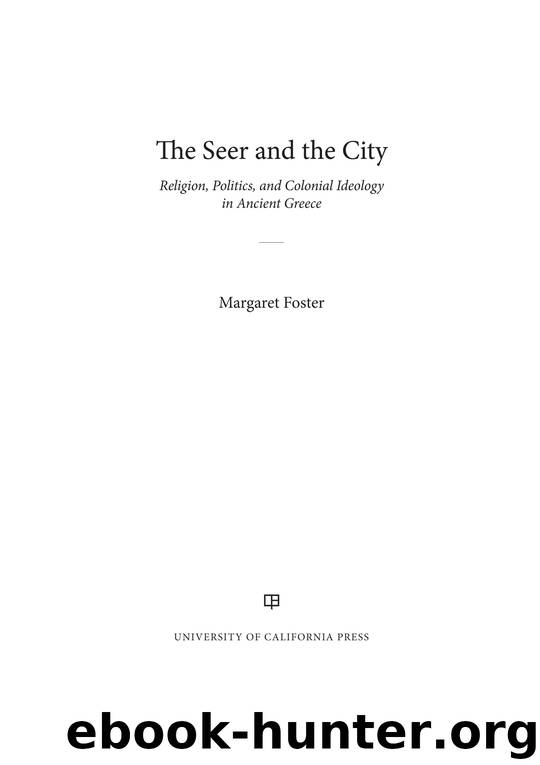The Seer and the City by Foster Margaret

Author:Foster, Margaret
Language: eng
Format: epub
ISBN: 9780520295001
Publisher: University of California Press
I. DELPHI, AMPHIARAOS, AND THE KROISOS LOGOS
I begin by stepping away from colonial discourse and seers temporarily to examine a more widespread rivalry between Delphi and the oracle of the seer Amphiaraos. Our evidence suggests that Delphi competed with a number of oracles. Catherine Morgan, for instance, detects a rivalry between Delphi and Dodona emerging in the late archaic period in which Dodona distanced itself from Delphi by aligning with the oracle of Zeus at Ammon. In so doing, Morgan argues, Dodona sought to resist the dominance of Delphi.4 Albert Schachter interprets the sudden increase in dedications at the Ptoion, the oracular sanctuary of Apollo Ptoieus in Boiotia, in the mid-sixth century B.C.E. as evidence that the local sanctuary benefited from Delphi’s temporary inaccessibility and decline during the same period.5 This inverse relationship between Delphi’s and the Ptoion’s prosperity suggests a motivation for competition between oracles: the sites vied for patrons and dedicants. We might also think of Aristophanes’ chrēsmologos in Birds and how his oracle of Bakis is pitted against Peisetairos’s own Delphic oracle (Av. 981–91).6 Finally, Roland Crahay has argued that, in Herodotus’s Kroisos logos, the oracles subjected to Kroisos’s test represent Delphi’s fifth-century rivals.7 In this part of the chapter, I would like to consider in detail an oracular rival of Delphi found in the Kroisos logos. When we return to colonial discourse in part 2, we will then be able to perceive colonial discourse’s own ideological strategies as part of a larger effort by Delphi to assert its primacy throughout the Greek world.
Herodotus’s Kroisos logos in book 1 offers a good starting point for tracing an ongoing current of competition between Delphi and the oracle of Amphiaraos, the so-called Amphiareion.8 Leslie Kurke’s analysis of Herodotus’s treatment of Kroisos and his interactions with the Delphic oracle provides a crucial framework for understanding this dynamic. I will summarize Kurke’s argument first before turning to consider how the Amphiareion fits into Herodotus’s presentation of Delphi.
In Herodotus’s extended account of the downfall of the Lydian king (1.46–92), Kroisos assumes that by bestowing extravagant dedications on Delphi, among other oracular sites, he will receive as compensation for this munificence straightforward oracular responses to his inquiries. What he does not realize, as Kurke demonstrates, is that his dedications to Apollo and the god’s responses to his inquiries in fact denote two “discrete and incommensurable ‘economies,’” an econo -my of gift exchange and an economy of oracles.9 Kroisos believes that his fabulous wealth is evidence of a privileged relationship with the divine. As long as he continues to compensate the gods materially, thinks Kroisos, divine favor, together with his power and prosperity, will endure. Accordingly, Kroisos assumes that the obligations of reciprocity inherent in this system of human-divine gift exchange should join Apollo to him in a reliable way. Yet, much to Kroisos’s surprise, the god’s oracles turn out not to conform to this gift-exchange model of reciprocity but rather to signify an entirely different system of interaction, one in which pronouncements from the gods are unreliable and unknowable.
Download
This site does not store any files on its server. We only index and link to content provided by other sites. Please contact the content providers to delete copyright contents if any and email us, we'll remove relevant links or contents immediately.
| Africa | Americas |
| Arctic & Antarctica | Asia |
| Australia & Oceania | Europe |
| Middle East | Russia |
| United States | World |
| Ancient Civilizations | Military |
| Historical Study & Educational Resources |
Mythos (2019 Re-Issue) by Stephen Fry(1197)
Alexander the Great by Robin Lane Fox(1182)
Antigone Rising: The Subversive Power of the Ancient Myths by Helen Morales(949)
On Sparta (Penguin Classics) by Plutarch(929)
The Classical World: An Epic History From Homer to Hadrian by Robin Lane Fox(890)
The Last Days of Socrates by Plato & Christopher Rowe & Plato(889)
Persian Fire by Tom Holland(832)
Cicero by Anthony Everitt(785)
The Athenian Constitution (Classics) by Aristotle(773)
The Greek World(702)
Antigone Rising by Helen Morales(662)
The Eudemian Ethics (Oxford World's Classics) by Kenny Anthony(648)
The Riddle of the Labyrinth(634)
The Story of the Greeks (Yesterday's Classics) by Guerber H. A(623)
Lords of the Sea: The Epic Story of the Athenian Navy and the Birth of Democracy by John R. Hale(620)
Guide to Greece by Pausanias(611)
The End of the Bronze Age by Robert Drews;(596)
The Homeric Hymns (Penguin Classics) by Homer(579)
Astrology and Religion Among the Greeks and Romans by Cumont Franz(576)
